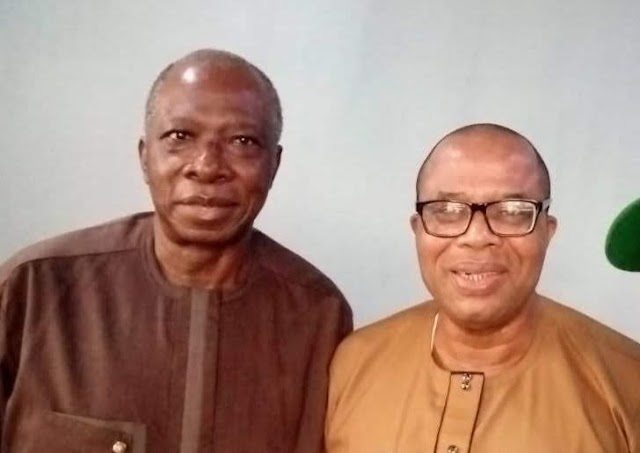 COMMUNIQUÉ ISSUED AT THE END OF A THREE-DAY TRAINING WORKSHOP ON IMPROVING GOVERNANCE AND ACCOUNTABILITY IN BASIC EDUCATION IN NIGERIA
COMMUNIQUÉ ISSUED AT THE END OF A THREE-DAY TRAINING WORKSHOP ON IMPROVING GOVERNANCE AND ACCOUNTABILITY IN BASIC EDUCATION IN NIGERIA 
PREAMBLE
Human Development Initiatives (HDI) in collaboration with implementing
Cluster Members, namely: Grassroots Health Organization of Nigeria
(GHON), Youth Child Support Initiative (YCSI), Patriotic Citizen
Initiatives (PCI), The WellBeing Foundation Africa (WBFA) and
Out-of-School Children Empowerment Foundation (OSCEF) with the support
of USAID Nigeria’ Strengthening Advocacy and Civic Engagement (SACE)
Project organized a Three-Day Training Workshop which focused on
Improving Governance and Accountability in Primary and Junior Secondary
Education in Nigeria at Grand Ibro Hotel Annex, Abuja from Tuesday, May
19 to Thursday, May 21, 2015. It was attended by 70 participants drawn
from Civil Society Organizations (CSOs), Parent-Teachers Associations,
community members, State Universal Basic Education Board and media
institutions from four geo-political zones in the country.
The workshop was aimed at improving and enhancing governance and
accountability for quality and accessible primary and junior secondary
education at the Local Government level in Nigeria. Participants were
enlightened and informed on child education under the Child Rights Act
(CRA) 2003, the roles of local governance on education, the roles of
relevant stakeholders viz: community members, Parent-Teachers
Associations (PTA), the media, Civil Society Organizations (CSOs), Faith
Based Organizations (FBOs), Non-Governmental Organizations, the Private
Sector and general public, towards the actualization of the Universal
Basic Education project.
The opening session of the meeting was chaired by Dr. MacJohn Nwaobiala,
Permanent Secretary, Federal Ministry of Education and the Keynote
Address was delivered by Dr. Gladys Makoju, Former Director, Policy
Planning Management and Research, Federal Ministry of Education. Other
notable speakers were Prof. Yemisi Obashoro-John, Faculty of Education,
University of Lagos; Dr. Theresa Stephen Gyang, Department of
Educational Foundations, University of Jos; Mr. Okafor Toochukwu,
National Moderator, Civil Society Action Coalition on Education for All
(CSACEFA); Mr. Tayo Alofun, Media Officer HDI; Mr. Theophilus Abbah,
Sunday Editor, Daily Trust Newspaper and Mr. Amara Nwankpa of Shehu Musa
Yar’Ádua Foundation. Participants were divided into groups during the
breakout session to deliberate on issues germane to Universal Basic
Education. Group sessions focused on: Improving CSO Capacity in
Monitoring the Educational Sector, Giving Communities a Voice in
Education Service Delivery; and Protection and Participation of Excluded
Groups in Education (Girl child, disabled, Almajiris, IDPs). After
robust discussions on issues relating to accountability and governance
surrounding basic education, the following observations and
recommendations were made:
OBSERVATIONS
The participants observed that:
- Lack of political will and poor
leadership on the part of government is a major problem in education.
Ineffective leadership has resulted in poor implementation of policies,
mismanagement of resources and failure to exercise responsibility and
apply sanctions.
- Inadequate effective institutionalized
structures and feedback system that monitors and evaluate educational
progress at the community level.
- Inconducive learning environment
affects students’ willingness to go to school. Dilapidated structures,
poor or lack of toilet facilities, poor ventilation and lighting,
absence of instructional materials demoralise students and teachers.
- Artificial financial constraints
resulting from State governments not utilizing available funds meant for
education. For instance, some states in Nigeria have refused to claim
counterpart funds made available by the Federal government provided for
education.
- Inadequate data bank on government
schools, number of students, teachers’ details, student details and
other information leading to data deficiencies, inaccurate, assumed and
falsified data.
- Use of persons in disciplines outside
their areas of competence; insufficient competent and committed teachers
and poor condition of service for teachers leading to low quality
education.
- Nonchalant attitude of
Parents/guardians towards their children/wards’ education negatively
affect the attitude of children toward school.
- Negligence and ignorance of parents/guardians on child’s rights.
- Inadequate community ownership and contribution to education has hindered the progress in education.
- Limited number of active CSOs working in the education sector hinders active participation in monitoring and evaluation.
- Excess bureaucratic bottlenecks in the education commissions.
- Inadequate research capacity and poor public relations of CSOs.
RECOMMENDATIONS
The Participants at the workshop recommended the following:
- Citizens should have a culture of
reporting deficiencies, failures and anomalies in the education system
through the media and other communication channels to act as a push
factor for proper implementation of education policies.
- CSOs should partner and encourage communities to demand accountability from relevant authorities.
- Government should harmonize the role of
Quality Assurance and inspecting agencies for effective and consistent
monitoring and evaluation of educational activities in the communities.
- Existing committees like the Village
Development Committees, School Based Management Committees (SBMC), Ward
Development Committees, Parent Teachers Association (PTA) etc., should
be strengthened and co-opted into advocacy to improve basic education.
- Government should provide appropriate,
physical and emotional climate for students to learn. Such as modern
classrooms, chairs, toilet facilities, etc.
- NGOs, CBOs, CSOs, PTAs, FBOs etc., should come together to appeal to the state government to access the UBE fund.
- Stakeholders (Parents, teachers,
community leaders, religious leaders, and others) should be encouraged
to mainstream Community Accountability and Transparency Initiatives
(CATI) into their programmes and processes.
- Data on government schools, number of
students, teachers’ details, student details and other information
should be improved and readily made available on e-portals; CSOs should
also build their capacity using such data for advocacy.
- Teachers’ Registration Council (TRC)
and other education regulatory bodies should be overhauled for proper
monitoring of the system. In particular teacher education should be
drastically improved and performance monitored.
- Education faculties in tertiary
institutions should not be considered dumping ground for unqualified and
incompetent students who could not gain admission into other faculties.
- Recruitment of qualified teachers should not be politicized and promotion of teachers should be strictly based on merit
- Stakeholders in education should
embrace continuous advocacy, targeted campaigns and use of IEC
instruments to sensitize the parents/guardians on policy and framework
of Universal Basic Education.
- Continuous sensitization using NGOs,
Faith-Based and Community-Based Organizations to creatively
contextualize and make education acceptable within the communities.
- Public officials should be mandated to send their wards to public schools.
Endorsed by:
- Prof. Sarah B. Oloko
Chair, Human Development Initiatives Board of Trustees
- Prof. Bolaji Owasanoye
Executive Director, Human Development Initiatives (HDI)
- Hajiya Hadiza Nagona
Executive Director, Grassroots Health Organization of Nigeria (GHON)
- Comrade Osita Osemene
Executive Director, Patriotic Citizens Initiatives (PCI)
- Dr. Yewande Ayoola
Program Manager, The WellBeing Foundation Africa (WBFA)
- Mr. Akeem Kelani
Executive Director, Out-of-School Children Empowerment Foundation (OSCEF)
- Mrs. Chiamaka Felicia Nwobodo
Program Coordinator, Youth Child Support Initiatives (YCSI)
- Mr. Vincent Adekoya
Lagos State Universal Basic Education Board
- Deacon Olusoji Adams
Chairman, Parent-Teachers Associations (PTA), Mainland Local Government, Lagos State
- Malam Isyaku Tukur
Chairman, Parent-Teachers Associations (PTA) in Gwale Local Government, Kano State
- Mr. Okafor Toochukwu
National Moderator, Civil Society Action Coalition on Education for All (CSACEFA)
- Mr. Olayemi Samuel
Research Officer, Human Development Initiatives (HDI)









0 Comments